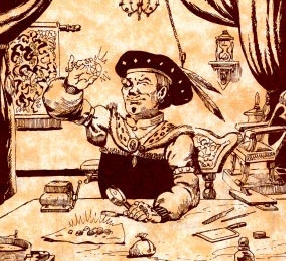

|
|
|
|
|
|
|
|
|
|
|
|
|
|
|
|
|
|
* Cost does not include all
remuneration or special fees.
Add 10% of the usual cost
of items handled or made by these hirelings on a per lob basis,
i.e. an armorer makes a
suit of plate mail which has a normal cost of 400 gold pieces,
so 10% of that sum (40 g.p.)
is added to
the costs of maintaining
the blacksmith.
A character with this proficiency can finish
the
rough gems
that are discovered through mining at a rate of 1d10
stones per day. A gem cutter derives no
benefit from the assistance
of nonproficient characters. Every gem-cutter
must work
with a good light
source, and needs an assortment of chisels,
small hammers, and specially hardened
blades.

Gem Cutter, Equipment: This character
needs a collection of finely tooled chisels, hammers, and vises.
Good light
sources are also important.
Most gem cutters keep sturdy safes or
strongboxes to protect their valuable materials.
Cost: 2,225
gp
Space: 15' x 15'
Jeweler-Gemcutter
(DMG):
This profession allows the character to have rapid and accurate appraisal
of any precious metal,
gem material, or piece of
jewelry
(except those which you,
as DM, specifically designate as “heretofore unknown”).
In addition, the jeweler-gemcutter
can set stones in various things (sword hilts, flagons, or whatever)
Making Jewelry: or
fashion jewelry from gem material and precious metals. <T1
gives a simple method: a fee double the value of the materials, which is
the value of the finished jewelry>
A simple ring will take
a week, a bracelet with sculpting two weeks (with stones set, three);
while a crown might require
a full year of work.
Increasing the Value of
Jewelry: Basically, the work merely adds either splendor to the PCs
personage by the display,
or the total value of the
materials can be increased by from 10% to 40%,
depending on the skill of
the individual doing the work.
Increasing the Value of
Gemstones: Likewise, as a gemcutter, the individual might well increase
the value of a rough or poorly cut stone
(those under 5,000 gold
piece base value),
or the stone might be ruined
in the process.
Note that jeweler-gemcutters
cannot be held responsible for damage.
Both functions are shown
below:
| Jeweler Skill Level | - |
| 01-20 | fair -- 10% increase 90% likely |
| 21-50 | good -- 20% increase 50% likely, + 10% otherwise |
| 51 -75 | superior -- 30% increase 60% likely, + 10% otherwise |
| 76-90 | excellent -- 40% increase 70% likely, + 10% otherwise |
| 91-00 | masterful -- 40% increase 60% likely, +20% otherwise |
| Gemcutter Skill Level* | - |
| 01-30 | shaky -- d12, one roll, 1 improves, 10-12 ruins stone |
| 31-60 | fair -- d12, one roll, 1-2 improves, 12 ruins |
| 61-90 | good -- d12, one roll, 1-3 improves, 12 ruins |
| 91-00 | superb -- d20, 1-5 improves, 20 ruins stone |
* Roll for this separately after determination of jeweler skill level.
Important: Players should never know the skill levels of jeweler-gemcutters!
COST: 100
gp / mo.
(Cost does not incl. all
renumeration or special fees.
Add 10% of the usu. cost
of
items handled or made by these hirelings on a per
job basis, i.e. an armorer
makes a suit of plate mail which has a normal
cost of 400 gp, so 10% of
that suit (40 gp) is added to
the costs of maintaining
the armorer.)
The Jeweler (terrain: city, levels:
any) (REF3.75)
<For simplicity's sake, it is best to assume that the Gemcutter skill subsumes the Jeweler skill>
<Note that the DSG provides two methods for the advancement of NPC artisans. If the level-based method is chosen (not recommended in most cases), it might be possible to correlate proficiency with Jeweler Skill Level. To convert a proficiency to a percentage, get the base ability, apply the ability modifier, apply slots gained from level advancement, multiply by 5, and subtract 10. For example, a level 1 Jeweler with 6 slots (2 spent on weapon, 2 spent on the proficiency, and 2 spent on increasing the proficiency) and a 15 DEX would be 65%: Superior.>